A Comprehensive Trauma-Informed Approach to Therapy
When your child has faced the profound impact of childhood trauma, whether acute or complex, you might find yourself grappling with overwhelming emotions and uncertainty about how best to support them.
At Trails Carolina, we empathize with the complexities involved in helping children navigate the aftermath of a traumatic experience. That's precisely why our program places a strong emphasis on prioritizing trauma-informed therapy for children and adolescents. Our mission is to assist them in processing their past experiences and equipping them with the skills to develop healthy coping mechanisms for long-lasting growth.

Our trauma-informed therapy approach is based on the latest trauma-informed practices, the guidelines for a trauma-informed approach laid out by the Substance Abuse and Mental Health Services Administration, and decades of experience helping youth and teens dealing with trauma, mental health challenges, and behavioral concerns through our programs. We understand that trauma can have a lasting impact on a child's mental health, and we work to create a safe and supportive environment where they can begin to heal.
Our team of licensed, trauma-informed mental health professionals, certified educators, and dedicated wilderness staff undergo periodic trauma training so that they can effectively help students overcome challenges and reach their full potential.
We believe that every child deserves the opportunity to heal from trauma and develop the skills they need to thrive in an environment that has their physical and emotional safety in mind, and we have been providing trauma-informed care to children and teens for over a decade. Our trauma-informed therapy program is designed to meet the unique needs of each student, with a focus on building resilience and fostering positive change.
If you're looking for a supportive and effective approach to helping your child process trauma, Trails Carolina is here to help.
What is Trauma?
According to the Substance Abuse and Mental Health Services Administration, trauma refers to an event, sequence of events, or collection of circumstances resulting in a combination of emotional, physical, or life-threatening harm.
Individuals who have experienced trauma often exhibit a trauma response, which can manifest emotionally and/or physically. T
hese responses may be triggered days, weeks, or even years after the original traumatic event and can significantly impact their ability to cope with daily life.
When trauma history is left unaddressed, trauma can have enduring effects on an individual's mental and physical well-being.
Trauma shows up in a variety of ways from withdrawal or dissociation to anger and rage. When an individual has experienced trauma, it may become lodged in the body. Although the original experience or “danger” has passed, the body/mind may become “stuck” in fight/flight or freeze responses. The result is emotional and nervous system deregulation.
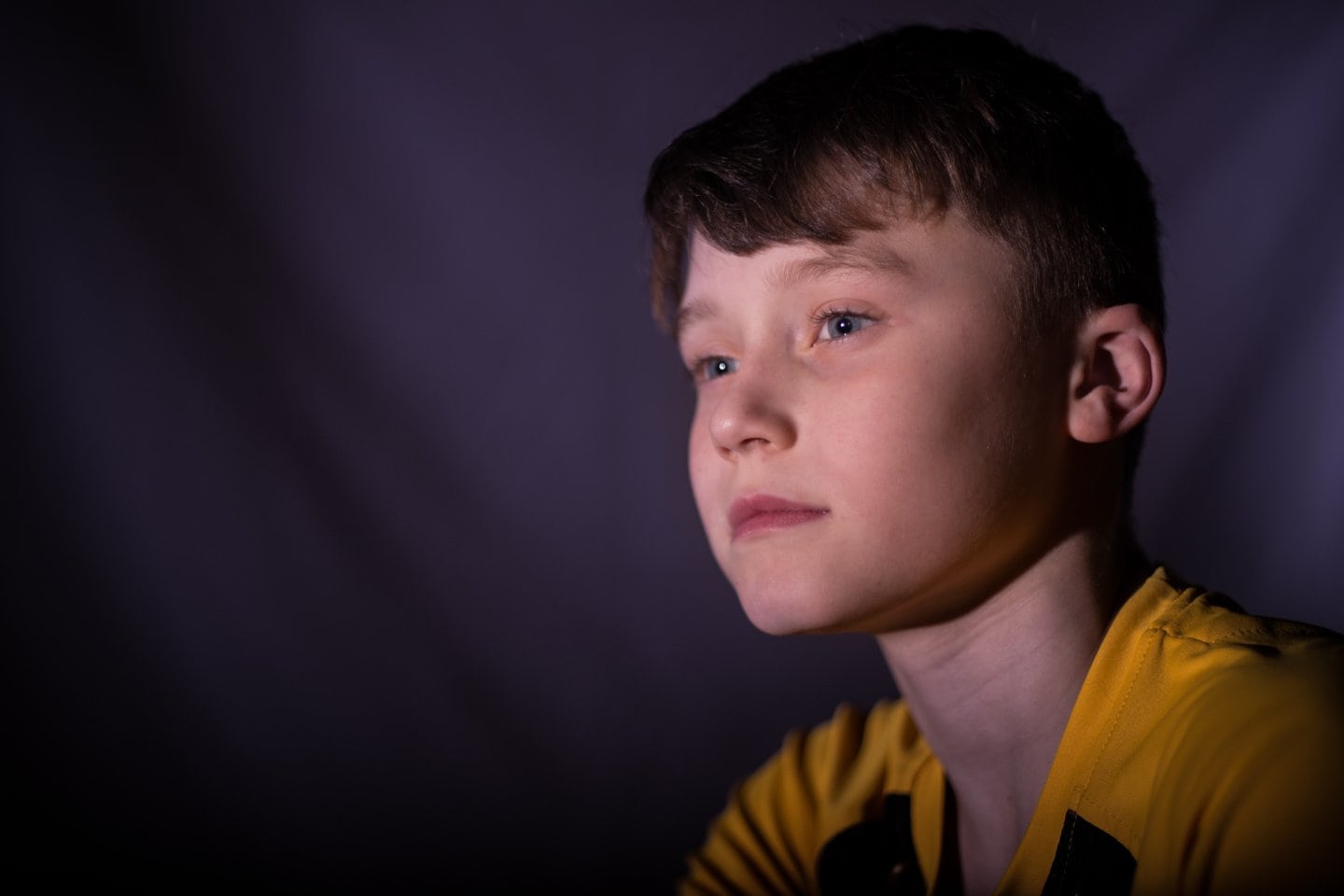
A wide variety of unhealthy coping mechanisms are then employed to compensate for this deregulation. By simultaneously treating the symptoms and the underlying cause, healing is more sustainable and long-term.
When it comes to treating children and teens with a trauma-informed approach, we must recognize and differentiate the ways in which trauma occurs, the source of the trauma, and the way it manifests in order to provide appropriate, personalized support.
Understanding Acute vs. Complex Trauma
When we think of trauma, graphic images of serious car crashes, sexual abuse, a school shooting, or an outburst of domestic violence might come to mind. These kinds of traumatic events are examples of acute trauma.
Acute trauma is characterized by a single traumatic event with a clearly defined beginning and end. These events can have immediate and intense effects on physical and mental health. Recovering from acute trauma often involves addressing the aftermath of this specific incident in order to prevent long-term symptoms.

Examples of acute trauma include:
- Car Accidents
- Natural Disasters
- Assault or Physical Violence
- Sexual Assault or Rape
- Witnessing a Violent Crime
- A Sudden Medical Emergency
- Sudden or Unexpected Loss of a Loved One
- A School Shooting
In contrast with acute trauma, complex trauma involves recurring traumatic experiences that persist over an extended period, frequently within an abusive or neglectful context.
Complex trauma can be more challenging to overcome due to its prolonged nature and the cumulative impact on an individual's mental and emotional well-being. Additionally, because complex trauma involves seemingly smaller events that build up over time, complex trauma is more likely than acute trauma to go undiagnosed.
Examples of complex trauma include:
- Physical or Emotional Childhood Abuse
- Neglect or Absence of Emotional or Physical Care
- Witnessing Ongoing Domestic Violence
- Persistent Bullying
- Chronic Family Dysfunction Due To Substance Abuse, Constant Conflict, or Divorce
- Growing Up With a Loved One With Substance Abuse or Mental Illness
- Frequent Moving or Changes in Living Situations
- Experiencing the Foster Care System or Multiple Placements
- Ongoing Community Violence
- Chronic Medical Conditions
- Multiple Instances of Loss and Grief
- War and Refugee Experiences
- Childhood Incarceration

Distinguishing between acute and complex trauma is crucial when treating children and teens who have experienced trauma because it significantly impacts the therapeutic approach, intervention and treatment strategies used, and long-term outcomes for these individuals.
Here are several reasons why this differentiation is essential:
- Symptom Presentation: The symptoms of acute and complex trauma can vary. Acute trauma may lead to symptoms such as flashbacks, anxiety, or nightmares related to a specific incident. Complex trauma can lead to a broader range of symptoms, including complex post-traumatic stress disorder (C-PTSD), difficulties with emotion regulation, and self-destructive behaviors. Accurate diagnosis helps trauma-informed therapists understand the symptom profile, choose appropriate interventions, and create treatment plans specifically designed to address the unique needs and challenges associated with the particular category of trauma.
- Timing of Intervention: Acute trauma usually demands immediate attention to manage acute distress and prevent long-term symptoms. In contrast, complex trauma often necessitates a more extended treatment plan due to its deep-seated and prolonged nature. Differentiating between the two enables appropriately timed therapeutic interventions. While acute trauma treatment is typically shorter and symptom-focused, complex trauma treatment extends over a more extended period to facilitate trauma processing, resilience building, and healthy coping strategies.
- Safety, Stabilization, and Risk Factors: Children and teens who have endured complex trauma often require specialized attention to address safety, stabilization, and associated risk factors. Their prolonged exposure to adversity may lead to maladaptive coping mechanisms, trust issues, and difficulties in forming healthy relationships. Additionally, complex trauma is linked to a heightened risk of comorbid mental health conditions like borderline personality disorder and dissociative disorders. Recognizing the trauma type enables a comprehensive risk assessment and tailored treatment to manage these concerns.
- Attachment, Relationships, and Social Context: Complex trauma frequently disrupts a child's capacity to form healthy attachments and relationships, often stemming from early caregiver attachment disruptions. Intense trauma-informed therapy is often needed to help the child process the complex trauma and aid them in cultivating secure and healthy relationships. Furthermore, children and teens with complex trauma backgrounds frequently originate from dysfunctional family systems or environments with complex family dynamics. At Trails Carolina, we invite parents and families to take part in the therapeutic process. Addressing these contextual factors together becomes a pivotal aspect of successful therapy, which may be less pertinent in cases of acute trauma.
At Trails Carolina, we understand the intricate nature of trauma and its profound impact on the lives of children and adolescents. Our trauma-informed therapy approach is specifically designed to help young individuals process and heal from these traumatic experiences within a safe and supportive environment, promoting their long-term well-being and resilience.
Symptoms and Signs of Childhood Trauma
Child and teen trauma survivors often exhibit a variety of trauma-related symptoms that can severely impact their emotional and physical well-being.
Childhood PTSD can result from exposure to traumatic events. Additionally, post-traumatic stress disorder (PTSD) is a mental health condition that can develop after a person experiences or witnesses a traumatic event and has its own set of symptoms. Children and teens who have experienced trauma are at risk of developing PTSD.
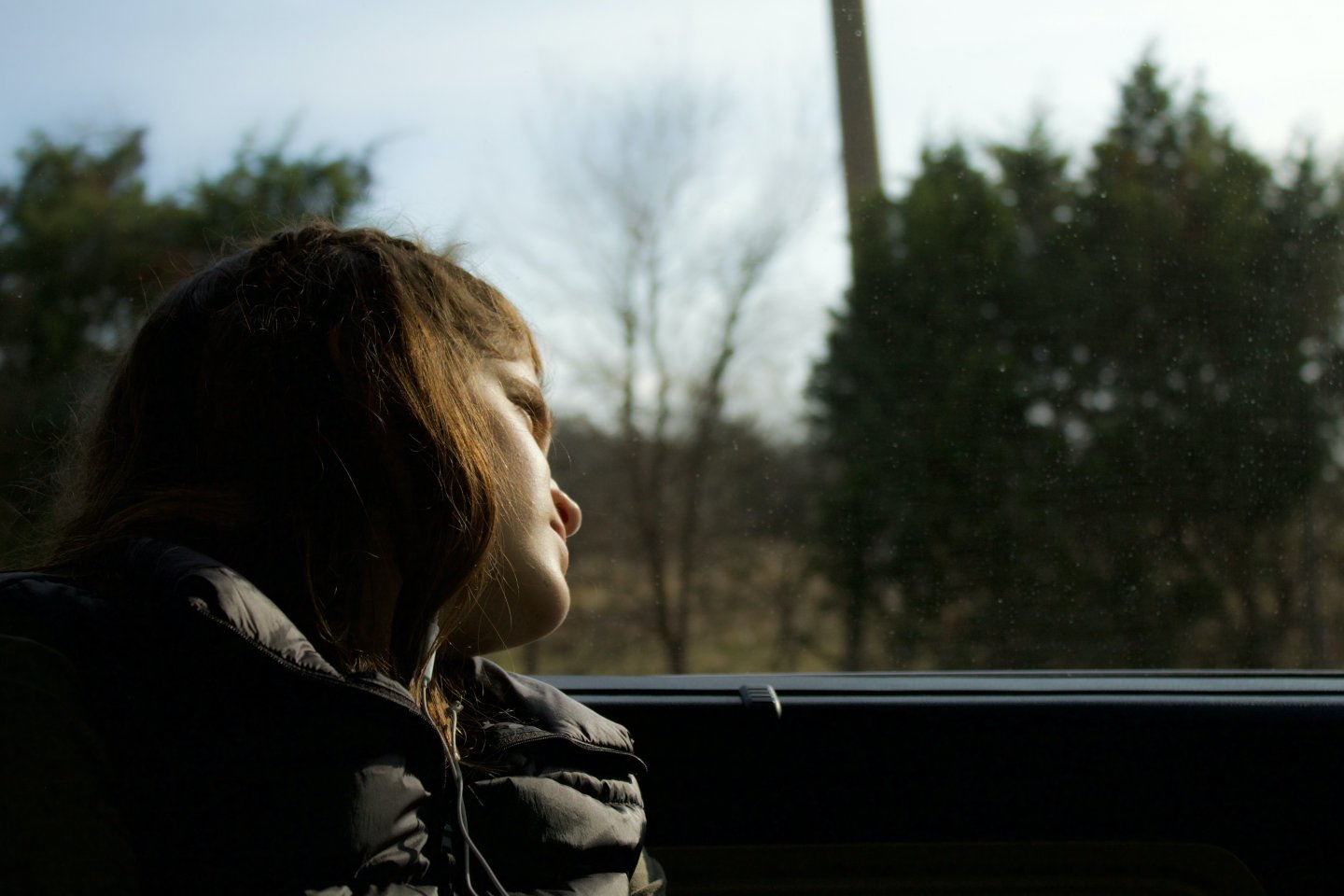
Trauma and PTSD symptoms in children and teens may include:
- Psychological and Emotional Symptoms: anxiety/anxiety disorders, depression, guilt and shame, anger and aggression, intrusive thoughts
- Physical/Somatic Symptoms: insomnia or sleeping all the time, headaches or stomach aches without a clear medical cause, increased heart rate and sweating when reminded of the trauma, sudden changes in eating habits or appetite
- Behavioral Symptoms: avoidance of places, people, or situations that remind them of the trauma, refusal to talk about or acknowledge the traumatic event, hyper-arousal, reverting to earlier, less mature behaviors (e.g., bedwetting in a previously toilet-trained child), isolating themselves from family and friends
- Cognitive Symptoms: flashbacks, where the child feels as if they're reliving the experience, negative self-perception, believing that they are bad or damaged, distorted thinking, blaming themselves or others unreasonably, exaggerated sense of danger or inability to trust
To support these survivors, a treatment improvement protocol is often adopted, ensuring that therapy and interventions are specifically tailored to address the unique challenges they face.
Understanding The Bio-physical Dynamics Of Trauma
Trauma results from the body-mind’s natural protective mechanism and response to danger gone awry.
When there is any threat or perceived threat, all animals including humans enter into a physiological state of fight or flight. If neither of these actions is successfully accomplished, we go into the freeze state, which is simultaneously numbing and activated.
By understanding this response and its natural resolution course, our clinicians can support healthy emotional growth progression toward more long-term healing.
- 57% of students have been in some form of outpatient treatment
- 17% inpatient
- 13% both in and outpatient treatment.
- The results of outcome studies indicate that 83% of participants made significant clinical improvements upon transition.
- 12 months post wilderness treatment participants have either maintained or continued to improve on initial outcomes.
- 24 months post wilderness 80% of families and 93% of participants report that “they believe their treatment was effective."

What is Trauma-Informed Care?
Trauma-informed care is an approach to providing mental health services that recognizes the impact of trauma on a person's life, highlighting the vital importance of behavioral health services in addressing the needs of trauma survivors.
At Trails Carolina, they understand that children and teens who have experienced trauma require specialized care to promote healing. Trauma-informed care involves creating a safe and supportive environment that empowers individuals to take an active role in their recovery, emphasizing emotional safety.

The Trauma-Informed Therapist
In this therapeutic approach, the trauma-informed therapist has a deep and comprehensive understanding of the impact of trauma on an individual's physical and mental well-being.
Trauma-informed therapists recognize that trauma can have long-lasting effects on a person's life and that these effects may manifest in various ways. Trauma can be caused by a range of experiences, including abuse, neglect, violence, natural disasters, and medical procedures.
Trauma-informed care involves recognizing the signs and symptoms of trauma and providing appropriate support to help individuals heal.
Ensuring Physical and Emotional Safety
A key element of trauma-informed care is the emphasis on physical and emotional safety, as trauma survivors may experience heightened emotional sensitivity and a sense of vulnerability. To aid their healing and recovery process, our team creates environments and therapeutic relationships where our students can feel physically and emotionally secure.
Trauma-informed therapists play a vital role in this process, as these professionals are trained to understand the intricacies of trauma therapy and the nuanced needs of trauma survivors. They recognize that healing from trauma is a journey and that recovery is not a linear process but involves setbacks and triumphs, approaching this journey with patience and compassion.
How Trails Carolina Provides Trauma-Informed Therapy To All Students
At Trails Carolina, we believe that trauma-informed care is essential for promoting healing and recovery for children and teens who have experienced trauma.
Our licensed therapists are trained in trauma-focused therapies that have been shown to be effective in treating PTSD and trauma in children and teens. We also use wilderness therapy as a way to help students connect with nature and themselves, which can be a powerful tool in the healing process.
One of the key ways we provide trauma-informed therapy is by creating a safe and supportive trauma-informed environment for our students. We work to build trust with each student and create a sense of community within our program. This allows students to feel comfortable opening up about their experiences and working through their trauma in a supportive and non-judgmental space.
Overall, our goal at Trails Carolina is to provide trauma-informed therapy that is effective, compassionate, and tailored to each student's needs.
This holistic approach to trauma-informed therapy allows us to address the whole person and provide a comprehensive treatment plan that is personalized to each student. We believe that with the right support and guidance, every student has the potential to heal and thrive.
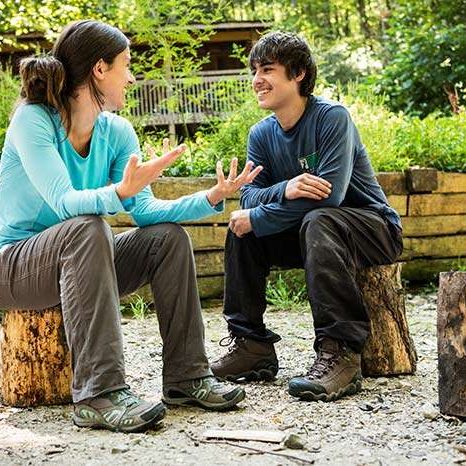
Individualized Treatment Plans
Every student who walks through our doors receives a unique and individualized treatment plan. We understand that trauma and PTSD can manifest differently in each individual, and, as such, we customize our therapeutic approach to address their specific needs.
Our licensed therapists are trained in a variety of evidence-based therapies, and they work closely with each student to create a personalized plan that may include therapies like:
- Trauma-Focused Cognitive Behavioral Therapy (TF-CBT),
- Eye Movement Desensitization and Reprocessing (EMDR), and
- Nature-based play therapy.
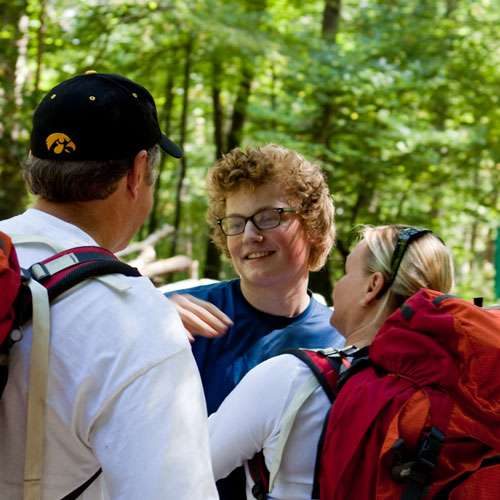
Supportive Peer Groups
In our trauma-informed care model, supportive peer groups play a significant role. We believe that healing is often enhanced through connections with peers who have faced similar challenges. Our students are encouraged to build trust and create a sense of community within our program, enabling them to open up about their experiences in a supportive, non-judgmental space. These peer connections offer a unique support system and help students navigate their healing journey together.
Parallel Family Programming
At Trails Carolina, we also recognize that trauma can impact the entire family. That's why we offer family therapy sessions to help parents and siblings understand and support their loved one's healing process. Our family coaches and primary therapists work with families to develop healthy communication skills and provide ongoing support throughout the treatment process. Healing is often a family affair, and we address this aspect with great care and attention.
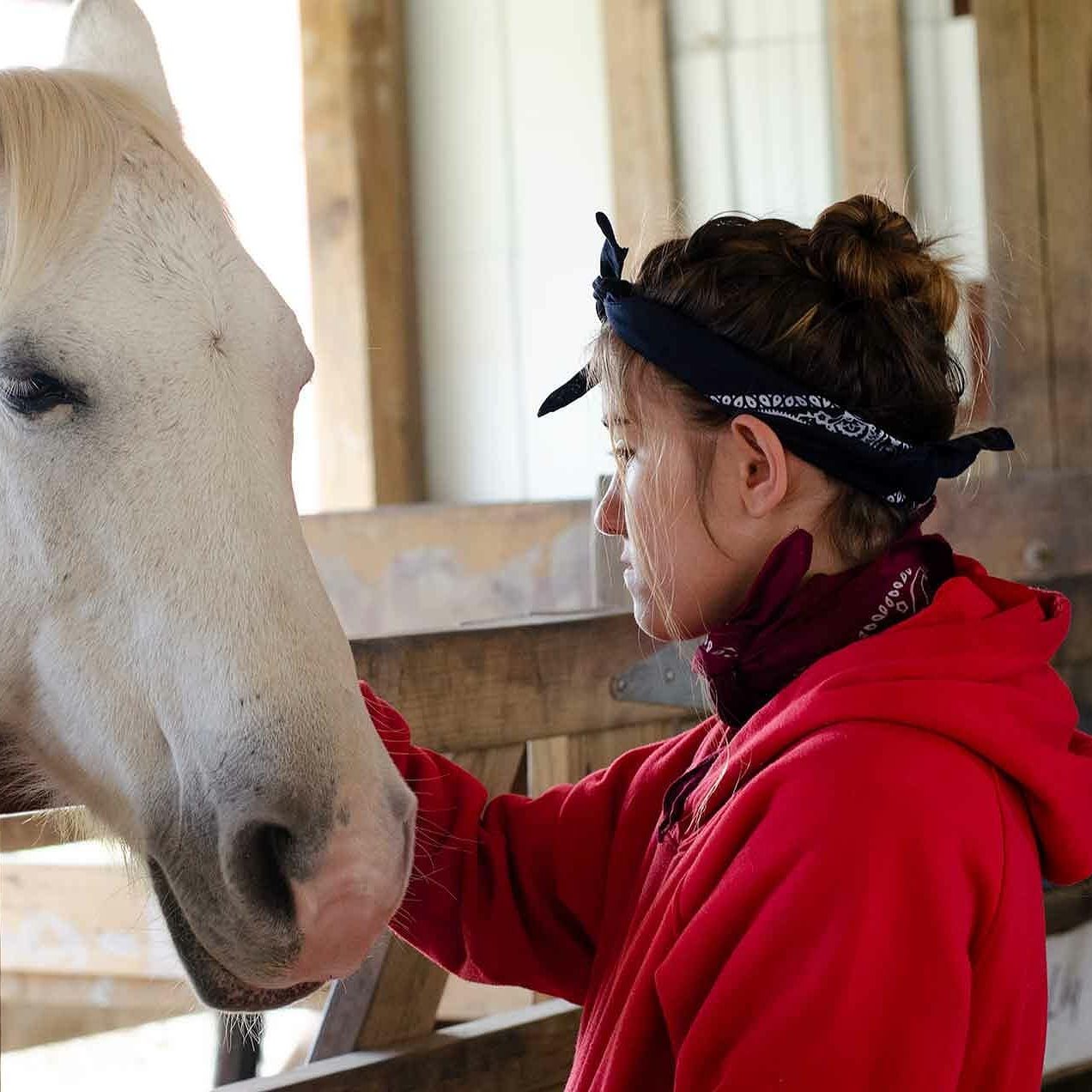
Natural Horsemanship
One of the distinctive elements of our trauma-informed practice is the use of equine relational therapy and natural horsemanship. Research shows that the bond between humans and horses can be a powerful source of healing.
Through our natural horsemanship program, students have the opportunity to work with these magnificent animals, developing trust, communication, and emotional regulation skills.
Horses are known for their sensitivity to human emotions, making them invaluable partners in processing traumatic stress symptoms. This equine connection often becomes a metaphor for the student's journey toward healing, offering insights and self-awareness that can be transformative.
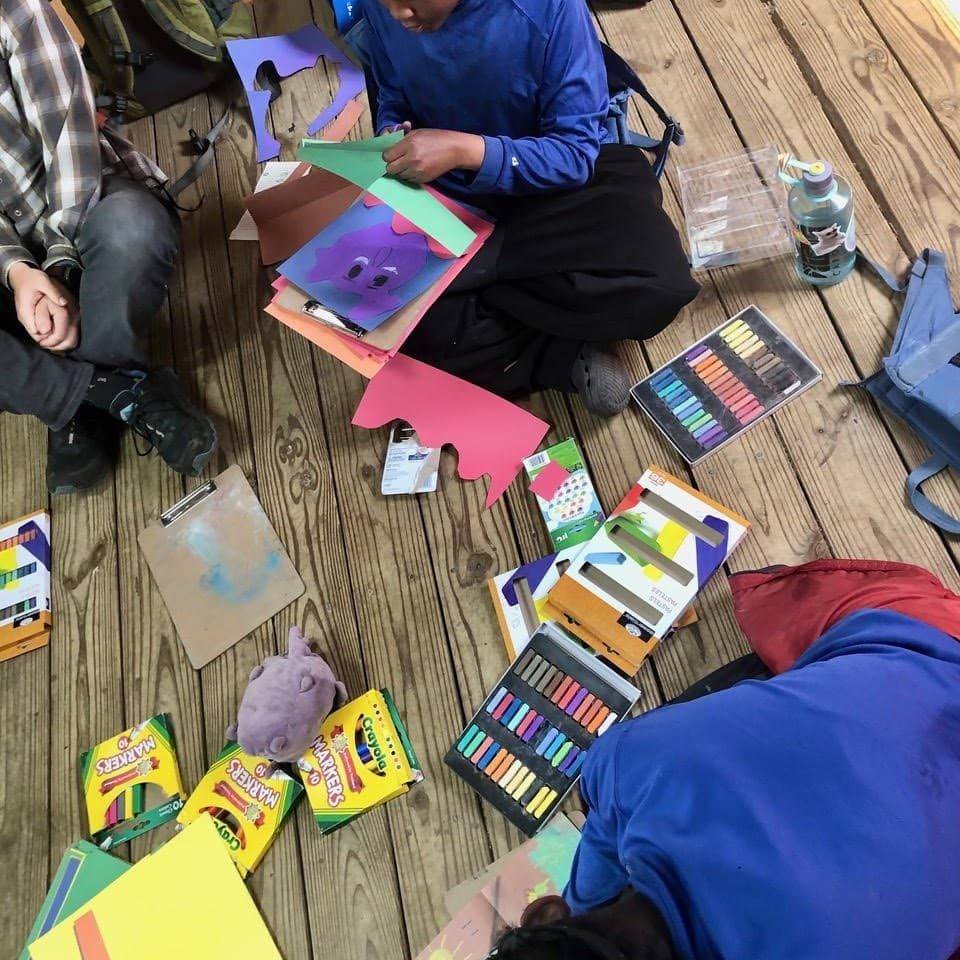
Accredited Academics
We recognize the importance of continued education in the lives of our students. Therefore, we offer accredited academics, ensuring that our students can maintain their educational progress during their time with us. By integrating academics into our program, we support the holistic development of each student, nurturing their intellectual growth alongside their emotional and psychological healing.
Intentional Transition Practice
The journey towards recovery doesn't end when a student completes their program at Trails Carolina. We place great emphasis on intentional transition practice, ensuring that each student has a plan and the necessary skills to reintegrate into their home environment, school, and community. This proactive approach sets our students up for long-term success as they continue their healing journey beyond our program.
At Trails Carolina, our commitment is to provide a holistic, individualized, and trauma-informed approach to therapy. With the guidance of our skilled team and the inclusion of equine therapy, peer support, academics, and family programming, we firmly believe that every child and teen has the potential to heal and develop healthy coping skills, ultimately thriving despite the trauma they have faced.
Trails Carolina for Child Trauma & Abuse Prevention
Child Trauma & Abuse Prevention: Trails Carolina offers therapeutic nature-based programs that demonstrate the benefits of wilderness therapy for teens struggling with trauma and abuse.
Drawing from the collective experience of over 90 years of wilderness and experiential-based therapy we incorporate a variety of interventions drawing from a vast array of experiential modalities.
Research has proven the success of wilderness and expedition interventions in helping troubled adolescents overcome traumatic life experiences such as abuse, learn coping mechanisms, and gain the ability to recognize triggers that cause adolescents to initiate self-destructive patterns.
Trauma shows up in a variety of ways from withdrawal or dissociation to anger and rage. When an individual has experienced trauma, it may become lodged in the body. Although the original experience or “danger” has passed, the body/mind may become “stuck” in fight/flight or freeze responses. The result is emotional and nervous system deregulation.
A wide variety of unhealthy coping mechanisms are then employed to compensate for this deregulation. By simultaneously treating the symptoms and the underlying cause, healing is more sustainable and long-term.
Get started today
Contact us today to learn how Trails Carolina can help your family
Trails saved my daughter’s life. Amanda is an amazing human and a brilliant therapist. I am so grateful to her, Science Steve, and the other wonderful people who could reach my daughter at a time when I could not.
Margot Lowman August 2022
Great life changing experience for our son. After becoming addicted to gaming during covid he was very depressed. At Trails he experienced the wilderness, Science Steve, learning survival skills and top notch therapy and support etc… I highly recommend! This gave our son and our family a renewed family bond full of love and excitement about his bright future.
Winnifred Wilson July 2022
Outstanding clinical work and superb staff! There’s a great culture at this company and it shows with how they engage with families/clients.
Kristin Brace June 2022
FAQs
Yes, Trails Carolina is a trauma-informed organization with a team of licensed mental health professionals who receive periodic trauma training and are experienced in providing trauma-informed therapy for children and teens.
Our staff is dedicated to creating a safe and supportive environment for our students to process their trauma and work towards healing.
Trails Carolina offers a therapeutic, nature-based program that demonstrates the benefits of wilderness therapy for teens struggling with trauma and abuse. Drawing from the collective experience of wilderness and experiential-based therapy we incorporate a variety of interventions drawing from a vast array of experiential modalities.
Research has proven the success of wilderness and outdoor interventions in helping troubled youth and adolescents overcome traumatic life experiences such as abuse, learn coping mechanisms, and gain the ability to recognize triggers that cause them to initiate self-destructive patterns.
Trails Carolina is a trauma-informed organization that stands out from other therapeutic wilderness programs due to our focus on trauma-informed care. We believe that trauma is often at the root of many behavioral and emotional difficulties that our students are facing. Our program is designed to help students work through their trauma in a safe and supportive environment, while also addressing other behavioral and emotional concerns.
The five principles of trauma-informed care are safety, trustworthiness, choice, collaboration, and empowerment.
At Trails Carolina, we strive to incorporate these principles into every aspect of our program to create a safe and supportive environment for our students.
Trauma-informed care is an approach to treatment that recognizes the impact of trauma on an individual's mental, emotional, and physical well-being. It involves creating a safe and supportive environment for individuals to process their trauma and work towards healing.
Trauma refers to an event or experience that is deeply distressing or disturbing and has a lasting impact on an individual's mental, emotional, and physical well-being.
Trauma-informed care is an approach to treatment that recognizes the impact of trauma on an individual's well-being and involves creating a safe and supportive environment for individuals to process their trauma and work towards healing.
